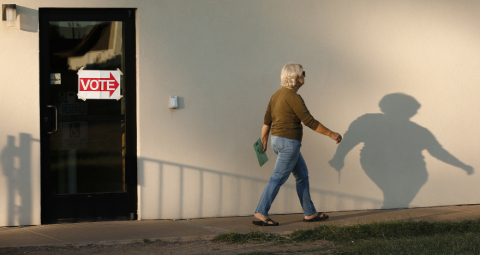November 15 | ![]() 0 COMMENTS
0 COMMENTS ![]() print
print

The difficult, yet noble art of politics
How should we respond as Catholics to one of the most interesting general elections of our times? Fr Jamie McMorrin writes.
In the primary school where I’m chaplain, one of the classes has a rule that forbids any mention of Christmas during the month of November, lest the children become prematurely excited by thoughts of presents and parties, and unduly distracted from the demands of the curriculum before the holidays.
I hope none of them are reading this article, or I’ll have to answer to the headteacher on Monday morning.
While this attempt to avoid festive fatigue sadly doesn’t extend to the wider world, it’s not so much anticipation of Christmas that dominates our news this November. Instead, the excited chatter on the airwaves and online is all about the upcoming UK General Election.
As a priest in a fascinatingly interesting election season, the convention in a polite society of not talking about religion or politics becomes almost as difficult as preventing a class full of seven-year-olds from talking about Santa in November.
Silence
Jesus of Nazareth, by contrast, hardly ever spoke about politics. On trial before the representatives of the Roman state, he remained silent, opening his mouth only to say that he stood for a Kingdom which is not of this world.
Still today, he defies party political pigeon-holing and he can’t be pressured into campaigning for any candidate. His manifesto—such as it is—is found in the Beatitudes: he stands for the poor, the persecuted and the pure of heart.
He is a friend to those who mourn and an admirer of the meek. He’s on the side of anyone who hungers for justice, who works for peace and who suffers for what is right. He legislates for love of God and love of neighbour and leaves the rest to us.
A visitor from the United States asked me the other week for the Catholic position on Brexit. I told him, honestly, that I hadn’t the slightest idea. If Almighty God has a perspective on the Irish backstop or the colour of our passports, He hasn’t communicated it to me.
Important issues
That’s not to say that these issues are unimportant. But they are beyond the competency of the Church and Her priests. The Church, in Her detachment from party politics, is better able to articulate Her timeless teachings on faith and morals which, in Cardinal Ratzinger’s memorable phrase, ‘are not decided by majority vote.’
As the Second Vatican Council put it, the Church ‘is not identified in any way with the political community nor bound to any political system’ the better to act as ‘a sign and a safeguard of the transcendent character of the human person.’ (Gaudium et Spes, 76).
That concern for the human person is the origin of the Church’s ‘preferential option for the poor’ and Her promotion of social justice; that’s what animates Her defence of the dignity of human life, from conception until natural death; that’s why She has a duty to stand up against modern-day slavery and human trafficking, and why She resists attempts to redefine marriage and gender identity.
Personal responsibility
The Church, when She is true to Her vocation, doesn’t care about power or party politics: She cares about people.
For all of us, that means taking personal responsibility for those around us, for our ‘neighbour’ both in the literal and in the Gospel sense. It also means, by extension, participating in elections, referenda and public debates, working together with all ‘people of good will’ to promote the common good of the human family.
Although priests are forbidden from playing an active role in political parties or trade unions, some individual lay Christians are called to dedicate their lives to what the Second Vatican Council calls ‘the difficult yet very noble art of politics’ as a worthy apostolate—not as representatives of the Church, but as individual, Baptised citizens.
Catholic politicians are counselled to see their work as a service to the whole human community, to be carried out with ‘integrity and wisdom, sincerity and fairness, and with the charity and fortitude demanded by political life.’ (Gaudium et Spes, 75).
Word of God
Like all Catholics, they have a responsibility to form their conscience by listening humbly to the Word of God and the teaching of the Church, but they are free to find particular solutions to the problems of our world in accordance with the light of their own natural reason and acquired expertise. They surely deserve our prayers!
It’s too soon to talk about Christmas, but if we must talk politics this November, here’s hoping we’ll all do so in a way that is constructive, considerate and charitable.
As we listen to and take part in the debates around the issues of our time, may we do so in a Christ-like way, and try, like the children in my school, to keep our excited passions at bay so as not to be distracted from the important work that is our civic—and Christian—duty this Christmas.










